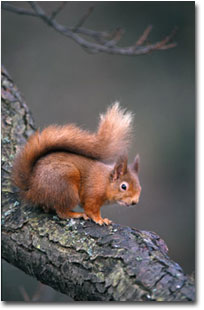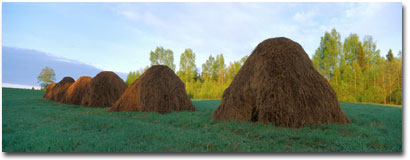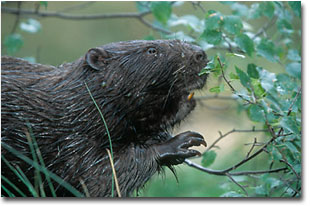|
|
 Photos for Food
Text and photography Copyright Niall Benvie
Professional stock photography is based on the principle of intellectual property rights. Were it not the case that users generally recognise the right of the photographer to be recompensed for their creative work and don¹t exploit it freely, we would not be in business. That may sound rather obvious, but when you consider how frequently the rights of musicians are infringed, on the World Wide Web and elsewhere, we should never take the status quo for granted. As a first business priority, always be ready to defend your intellectual rights. Licensing rights are all we have to sell; a piece of film is in itself worth very little. The natural tendency when figuring out a new career is to look at those who appear to be successful, find out the route they’ve taken, then try to emulate that. In nature photography, however, where there are as many different routes and definitions of success as there are established professionals, this approach is the surest way to fail. This is a business where individuality is valued highly. Under no illusion are qualifications or professional distinctions going to cut any ice with editors. While established photographers find it easier to have their work seen, superior pictures from an unknown photographer on the same light table will normally be selected ahead of those from a “name”. It helps a lot at the outset to be clear about your career goals. You
don’t need to publish more work than everyone else to have a good living,
but equally, don’t expect ever to be able to switch off from wondering where
new business will come from. If you want to furnish a lavish material
lifestyle, then this is probably not the career for you, and if profit for
you is purely a financial matter, then you may sometimes be disappointed by
the bottom line. While undoubtedly a business, nature photography has a lot
in common with vocational professions; life and work are integrated and
you’ve got to decide how to allocate time to business and family. Both
demand much more than can given and everyone concerned needs to be
While a value can and should be attached to quality field time - experiences that others have to spend disposable income on acquiring - the need to fund the business and its growth (in this sense, a benign model in which the photographer adds to his stock of experiences and images) is ever present. I learned during my farming days that it was always better to spend an afternoon trying to figure out ways to make more money than trying to save on what I was already spending. Nevertheless, you can load the dice in your favour by keeping your overheads low. If family permits, live in an inexpensive part of the country or even consider moving abroad. If you plan to do most of your work in the country you live, locate yourself in the richest biological area. It sounds like common sense, but there are more than a few photographers servicing large mortgages in suburbia. Foreign travel is enticing and will often yield pictures of subjects more in demand than domestic ones but don’t lose sight of the fact that it is not turnover, but actual profit that counts. If it is questionable, in order to make £70 000 pounds of income you need to spend £65 000, then the effort is worthwhile. A low input, low output model is more appropriate at the start of a business; the servant with two talents probably worried a lot less than the one with three and still ended up with the same return on capital. One significant capital expense which previous generations of photographers didn’t have to budget for was a computer system to allow the storage and distribution of their images. The shift to on-line image searching has been dramatic and increasingly, high- resolution files are finding their way down broadband lines too. Without these facilities, much of your potential customer base is going to pass you by in future. You may wonder, in view of the large number of well-tooled, well
traveled and often well financed photographers also trying to establish
themselves as professionals, if the competition is just too stiff to make
your own success likely. My own feeling is that the competition argument is
over-stated. Yes, of course it is harder to get established than it used to
be - and in what creative field is that not the case? Just consider
how homogenous most of that photography is. It is not to say that it is not
good photography, it is just that it is not necessarily distinctive in its
Like other businesses, suppliers able to add value to their raw material are at a competitive advantage. It is no longer enough simply to shoot great pictures and supply them to a few stock libraries. Lots of other people can do that. Value is added when the photos form part of a package - concept, words and pictures - and is presented effectively to as many potential users as possible, either over the web or as ink jet promotions. Writing has become a central part of my own business (we published almost 140,000 words, including a 45,000 word book, between 2000 and 2002 alone), giving a context to the photography and, in my case, allowing a much greater percentage of my keepers to find their way into print than they would as stock. The appetite for stories, the need for narrative, is something innate in people and in a purely business sense, story telling is a skill worth developing. Other photographers supplement their income by giving seminars and leading workshops. I used to do this as well, but realised that I wanted to be a writer and photographer rather than a teacher and stopped. The same information can be much more widely disseminated in magazine articles. On reflection, I believe now that workshops are something best reserved for the end of a career when a lifetime’s experience can be drawn upon. Don¹t say you were thinking of retiring on a pension! It seems quite common for photographers to bank on a continuing income from stock and royalties to see them through old age having used potential pension contributions to fund a full and interesting life when they were best able to take advantage of it. What would we do during our retirement anyway? Niall Benvie - NPN 018 Comments on NPN nature photography articles? Send them to the editor. |
|
|
 Nature photography must be one of the easiest professions to enter. No
qualifications are required, there are no examinations to pass, and no
regulatory body exists to vet entrants. The question you might like to ask
someone bragging of their professional status, however, is “how long?” While
becoming a professional nature photographer is simple, remaining one is a
different matter. Getting a few pictures published is not hard; sustaining
the necessary level of income week after week, year after year is altogether
more testing. Almost 10 years into my career, I’d like to share some of the
things I’ve learned about the business along the way. And as we will see,
in spite of the huge proliferation of people taking great pictures, there
remain plenty of opportunities for new entrants with particular abilities.
Nature photography must be one of the easiest professions to enter. No
qualifications are required, there are no examinations to pass, and no
regulatory body exists to vet entrants. The question you might like to ask
someone bragging of their professional status, however, is “how long?” While
becoming a professional nature photographer is simple, remaining one is a
different matter. Getting a few pictures published is not hard; sustaining
the necessary level of income week after week, year after year is altogether
more testing. Almost 10 years into my career, I’d like to share some of the
things I’ve learned about the business along the way. And as we will see,
in spite of the huge proliferation of people taking great pictures, there
remain plenty of opportunities for new entrants with particular abilities. comfortable with the self-absorption of the creative spirit. The upside is
the flexibility of working hours (once you’ve learned to stop now and
again) and the different life perspective and experience that this type of
work brings to those near it.
comfortable with the self-absorption of the creative spirit. The upside is
the flexibility of working hours (once you’ve learned to stop now and
again) and the different life perspective and experience that this type of
work brings to those near it. style or content. And that’s simply because most of your potential
competitors tend to follow the established routes to celebrity species and
locations. There is no less demand than there ever was for original talent
with a fresh view of the world and new stories to tell. Following your own,
distinctive route will not lead to short term financial success but it can
sow the seeds for a more enduring career, if you stick with it.
style or content. And that’s simply because most of your potential
competitors tend to follow the established routes to celebrity species and
locations. There is no less demand than there ever was for original talent
with a fresh view of the world and new stories to tell. Following your own,
distinctive route will not lead to short term financial success but it can
sow the seeds for a more enduring career, if you stick with it.